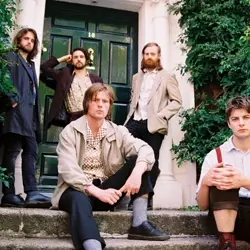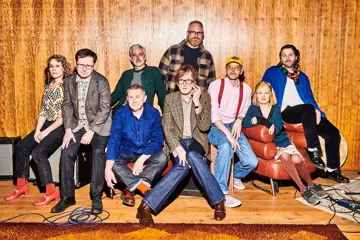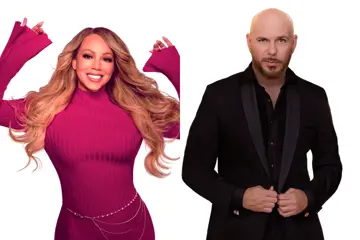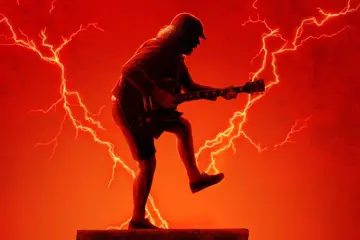 Fontaines DC
Fontaines DCWhen Fontaines D.C. were crowned a Band To Watch in January 2019, it’s unlikely that anyone expected where the band would go from there.
Formed in Dublin in 2017, the Irish quintet—vocalist Grian Chatten, guitarists Carlos O’Connell and Conor Curley, bassist Conor Deegan III, and drummer Tom Coll—already have four albums under their collective belts. They’ve solidified their position as one of the rock world’s most hard-working and in-demand bands, appearing at festivals like Glastonbury, Pukkelpop, Sziget, Fuji Rock, and in Australia, commanded crowds at Laneway Festival and at sideshows last year.
The band burst onto the post-punk scene with their dynamic, brilliant first album, Dogrel, in April 2019. Dogrel was named Album of the Year by record store Rough Trade's website, voted Album of the Year by presenters on BBC Radio 6 Music, and was nominated for the prestigious Mercury Prize.
While on the road promoting the record, Fontaines D.C. were working on another LP, stretching their sound with July 2020’s A Hero’s Death. They were nominated for Best Rock Album at the 2021 Grammy Awards, losing out to The Strokes’ The New Abnormal.
Fontaines D.C. began to offer a soothing yet rocking reprieve during pandemic times, but with April 2022’s Skinty Fia, they looked inwards at their identity as Irish men living in London and released their “first overtly political song,” I Love You.
Today, Fontaines D.C. are back with Romance, their fourth album in five years and their most adventurous LP yet.
A collection of 11 tracks that seem less personal than before, Romance is an album inspired by “falling in love at the end of the world,” per Chatten, “about protecting that tiny flame. The bigger Armageddon looms, the more precious it becomes.”
Maybe Romance Is A Place
In the teaser for the album's first track, the title track, the band got cinematic, sharing an eerie video from a hotel hallway, not unlike the one from The Shining. Instead of blood rushing through the space, bright green liquid carried through the room, kicking off the new album campaign with a bang—and a scare.
Catching up with Conor Curley ahead of the album’s release, the guitarist tells The Music that they found inspiration from films they started watching on tour. The conversations about movies—including Katsuhiro Ôtomo’s anime Akira—began to enter discussions about music, something Curley says was “exciting” for the band.
“All our work was so based on [being] in Dublin, and then we were in London. It was all very place-driven, and obviously, I feel like, in our camp, the idea of doing that again seemed a little bit too hard to try and dig up inspiration. So, it was just exciting to think of a fictional, imaginary world where you could place these songs.
“When you put yourself in that direction, and you start talking about themes that are still very human, then it becomes universal because it's like an example of a kind of made-up person.”
On Romance, Fontaines D.C. sound less “punk” than they ever have—not that they have ever proclaimed to be purely punk. A real highlight comes in the flow of Bug into Motorcycle Boy—the new single In This Modern World also carries some of their motifs and soundscapes.
The former wouldn’t sound out of place alongside R.E.M. or The Cranberries, offering up a mystique and gorgeous jangly sound straight out of the ‘90s. On Motorcycle Boy, the band bring in the looping and melodic sensibilities you might hear from Radiohead, circa Kid A and Amnesiac. The ‘90s return on Death Kink – more on that one later.
Working in the new influences and expanding their sonic palette to showcase some new inspirations—Mos Def, A$AP Ferg, OutKast, and Korn—reworking the electronica made present on Skinty Fia, embracing strings, space, and falsetto, putting away the electric guitars (sometimes), and growing in confidence, Romance sees Fontaines D.C. in their fullest form.
Some of that form was likely assisted by producer James Ford (Arctic Monkeys, Blur, Florence + The Machine) after their previous three albums were created alongside Dan Carey (Kae Tempest, black midi, West Leg).
On working with Ford, Curley says, “James is great for doing the maximum of what you want, like bringing the sonics of your own idea to more of a high-definition place than [what] our previous album sounded like. On [first single] Starburster, we [were] like, ‘Oh, the drums are supposed to be big.’
“We have what we've done, and then his skill as a producer is [creating] a unique sound for your record. He's incredibly talented, a producer and a musician in his own right. He was really inspiring to work with.”
Another change that came with Romance was the band’s signing to XL Recordings, departing Partisan Records after Skinty Fia; they’re now on an eclectic roster alongside Radiohead, Thom Yorke and The Smile, Peggy Gou, Kenny Beats (who’s co-produced the last two IDLES records, CRAWLER and TANGK), and Burial.
Curley says of the move, “It was an amazing feeling when we moved over there. You go over to the office, and you see all the things on the wall, you know, all the Prodigy stuff, and even The White Stripes… there’s a lot of their stuff in their offices and the toilets [laughs].
“You kind of come out of the toilet feeling so much pressure on you, but it's amazing. It's a dream. [XL has] always been at that level that I feel even people who aren't super into the label world [know its reputation]. I feel like XL has always been known, and it's such a rich legacy. It's a really nice thing to be a part of, and they've been so gracious and so nice so far.”
No One Wants A Madness They Start To Understand
Starburster, the album’s explosive first single, was inspired by a panic attack Chatten had in St. Pancras station in London. The singer sent the band a demo early in the album’s writing sessions.
“I was going over to his house every couple of days, he was coming over to my studio, [and] we were just showing each other bits that we were working on, and he showed me that tune,” Curley begins.
“I was just like, that's insane, man. I didn't have any lyrics yet, so it was just the vocal, [which] sounded the same, but it was [recorded] phonetically. We were listening to a lot of hip-hop stuff backstage when we were on tour with the Arctic Monkeys, and I think that just seeped into Grian’s writing.
“He was super inspired by it and tried to do it within his own vision. And it's completely that, and I think a big thing for this record as well, like, sonically, is that we all got Mellotron keyboards.
“A lot of the tunes either have strings on them or that kind of Mellotron part, like the song Sundowner is all Mellotron as well. That instrument made it really easy for us to either put strings on something or give a vibey kind of keyboard sound.”
Later on the record, Fontaines D.C. revisit a Dogrel classic, Boys In The Better Land, by creating the “ghost” of that track on the energetic and sure-to-be fan-favourite, Death Kink. Curley says he’s “incredibly proud” of how creative the band has become, even when sort of creating a sequel song to an earlier track.
“To be part of a group who've been pushing to try and be prolific, not just wanting people to see us as prolific, but wanting to do it because we need to be creative, and being in a group of lads like that, I'm incredibly proud to have done that, and do it in and still be friends.
“Every creative switch has happened through mates talking about stuff that they're into at the time, and that's really organic. It's just an incredible thing to be a part of.”
You Were My Favourite For A Long Time (All The Pieces Last Forever)
On another new song fans have eagerly embraced, the Britpop-inspired album closer Favourite, Grian Chatten had originally penned 12 verses, and his bandmates kept it going through jam sessions. How did the band edit them down? And could we ever hear an extended version?
“It’s such a fun time to play some of those songs that, once it begins, you can just ride the wave of it for ages,” Curley shares. “I think Grian was on a spark once he had the Favourite motif that he had so many different angles to write so many verses. But yeah, it'd be cool to do the long version live sometime.
“We're always up for doing stuff like that. This is a really exciting time to start getting new songs into the set because you realise the difference between recorded music and live music. Even when we're doing Starbuster, we're extending the ending because the ending is so abrupt. It’s fun to be flexible between the two worlds, and I think that's something that we enjoy doing, and we can see fans enjoying.”
During the making of Romance, Curley says he and the band were “very focused,” adding that they were “flat-out,” as if they had tunnel vision on the motorway. There was a bit of a frantic nature to recording, with the process speeding by. The band enjoyed a four-week writing session, two days off, and then they were recording in France.
“Everything became microscopic in detail,” Curley explained in the album’s bio. “There was no breathing space between writing and recording. It flew quite close to the band having an aneurysm–and it needed that, really. Romance has the true madness of a late-night session.”
Detailing some of that madness with The Music, Curley recalls two of the main elements of the creative process: solitary writing sessions and… ADHD.
“I don't know if it's an ADHD thing or something, but when we're writing, [we find] that, once you go too far into the hard stuff, we're like, ‘No, no, no,’” Curley explains with a laugh.
“It's like, I need to clear my ears with something softer. We’re always flipping between the two. As an artist, I suppose I wouldn't want to have an album of, like, absolute slammers. I'd miss having those moments of more tender music and delving into string-led music because that's such a big creative thing for us.”
On the writing sessions, he notes, “We did the writing process for this one in a studio by ourselves. We were demoing, whereas before, we would write, phone record and keep finishing the sound that way, and then probably demo it. But with this one, we played it a couple of times, got a good arrangement, and then put it in the laptop pretty much straight away and then chopped it up from there. The focus part was wanting it to be good.
“But by the end, when we listened to it, I had no idea if it was any good or not because my ears have been in every song for so long, and there was a track on the album that I sing [Sundowner, where his vocals feature “by accident”] and stuff, so I obviously felt weird about that, because I was like, ‘Jesus, I don't know if this should be [there].’ Two days after that, when I listened to the album after having a break, I was like, ‘This is fucking amazing. We've done it.’”
Romance is out now via XL Recordings/Remote Control. You can listen to the album or buy it here.






